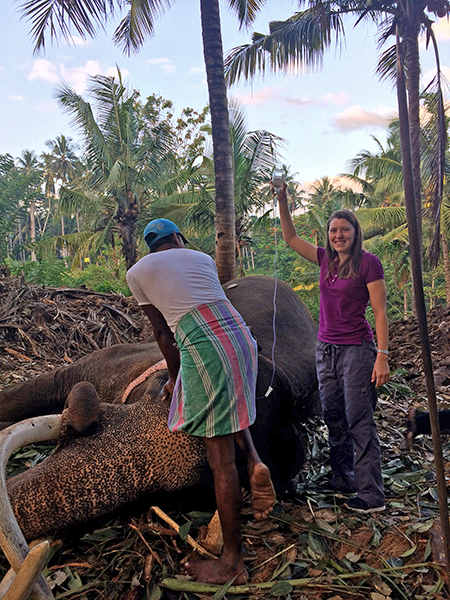Veterinary School Prerequisites
Academic Planning Guide for Students Interested in Veterinary Medicine
The requirements for admission to veterinary schools are determined by the individual veterinary schools. Listed here are the typical requirements and equivalent Stanford courses that fulfill those requirements. Please refer to the American Association of Veterinary Medical Colleges (www.aavmc.org) and/or with each veterinary school for the specific requirements of all U.S. and Canadian veterinary schools.
Additionally, the courses below reflect the 2020-2021 academic year course offerings and may not reflect any course changes that occurred within the academic year.
Additional courses that may be required or useful for admission (vet school dependent): Microbiology, physiology, cell biology, animal science, animal nutrition, immunology, and psychology.

Competency
National Recommendations
Stanford Course(s)
Chemistry
2 years coursework with lab work
(includes general chemistry, organic chemistry, and biochemistry)
Chem 31A + 31B OR Chem 31M
AND EITHER
- Chem 33 + 121 + 141 + 143
OR
2. Chem 33 + 121 + 123/124* + 171 + 181
(please see NOTES section)
Biology
1 year coursework
Labs
Biology: Biology 82 + 83 + 84 + 86
OR
Human Biology: HumBio 2A + 3A + 4A
Two of the following laboratory courses:
Biology 45, Biology 46 (or 47), BioE44, BioE51, Surgery 101
Physics
1 year coursework with lab work
Physics 21/22+ 23/24 + 25/26
OR
Physics 41/42 + 43/44 + 45/46
OR
Physics 61/61L + 71/71L + 81/89L
English
1 year
(should include writing skills)
PWR Course Requirements
AND
Additional one-quarter elective course
Math
1 year coursework to
include Statistics
Math 19 + 21 + 21
(please see NOTES section)
OR
either 51 or CME 100
AND: any statistics course
* Course numbers in italics are labs. Please see below for more details about how to choose courses.
Since the pre-veterinary curriculum is a component of a student’s education at Stanford, not a major, students can explore a wide variety of academic areas and majors according to their area of interest. When courses are taken often depends on when the student plans to enter veterinary school. Taking a year off before veterinary school is often a healthy alternative and allows students much more flexibility in scheduling their pre-veterinary courses. It also further allows students to explore diverse curricular programs, such as studying abroad, becoming involved in research projects, etc., over their full four years at Stanford.
It usually takes a year to complete the entire application process.
PLEASE NOTE:
- Veterinary schools are not consistent with how they view AP credit. We recommend that you take an additional course at the university level even if you have the AP units in math or physics. Veterinary schools expect these required courses to be taken for a letter grade.
- Math requirements for veterinary schools vary widely. Some veterinary schools do want to see a year of college math, which can include calculus and statistics. Some veterinary schools will accept AP credit. You should also be aware of any math requirements for your majors of interest.
- The chemistry sequence at Stanford is unique, and the courses are not easily matched to those at other colleges and universities, especially if you are trying to match quarter classes to semester classes. Please consult a pre-health advisor before deciding to complete chemistry requirements elsewhere.
- Many schools are now requiring or highly recommending biochemistry. There are multiple ways to satisfy biochemistry through coursework and it is imperative that pre-vet students check with their major departments on how best to complete the Chemistry sequences if their major requires Chemistry courses.
- Advanced coursework in biology (such as molecular biology and genetics) is highly recommended by many veterinary schools.
- Please exercise caution if switching from the Biology foundation courses to the Human Biology core, or vice versa.
Adapted from Stanford Academic Advising; Vice Provost from Undergraduate Education
Obtaining Veterinary Experience
Veterinary schools expect that applicants will have significant amount of experience in the veterinary field. Animal-related work experiences may not count. Some clinics have formal shadowing programs, but you may need to contact the clinic you are interested in directly. Keep an open mind and get exposure to multiple areas of veterinary medicine such as working with a veterinarian in a small animal clinic, equine practice, zoos, aquarium, or research animal facility. Learn as much as you can during your experience and ask questions.
It is recommended that you maintain a log of the experiences you have had and stay in touch with veterinarians you have worked with (and thank them after your position has ended) so that you can request a letter of evaluation for your veterinary school application.
Here are a few local organizations that Stanford pre-veterinary students have volunteered at:
Article Read: "How much experience is enough?"
Check out this article that goes over how much practical experience can benefit your application when applying to veterinary school.
Updated September 7, 2023